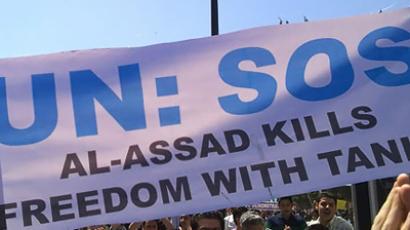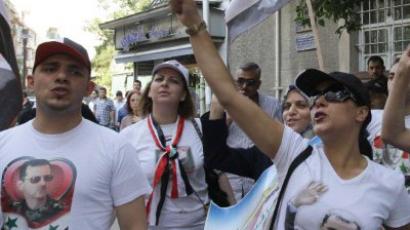Diplomatic purdah for conflict-torn Syria
Over 300 deaths in clashes between the army and protestors against the rule of President Bashar Assad have pushed the international community to raise its voice against the violence being perpetrated on Syria’s civilian population.
The crackdown on opposition protests that has dragged on for five months has pushed Syria to the brink of civil war. Opposition activists are reporting intensifying artillery and gunfire in the town of Deir al-Zor where a massive military assault was launched against Sunni protestors, at least 42 of whom were killed there on Sunday alone.As of today, an escalating government crackdown on protesters has brought increasing isolation of Assad’s regime, most importantly among its own Arab neighbors.Ankara, for its part, has told Bashar Assad that he risks the same fate as Egypt’s former president, Hosni Mubarak, who is on trial in Cairo on charges of corruption and ordering the killing of protesters during an uprising very similar to the one taking place now in Syria.Turkish Foreign Minister Ahmet Davutoğlu is due to arrive in Syria on Tuesday to pass on the harsh message that Ankara’s patience is running out and that Bashar Al-Assad risks losing Turkey’s support if violence continues. The Turkish authorities say the outcome of the visit will determine the course of Turkish policy towards Syria. “The process from now on will take shape according to the response [al-Assad] will give and the practices on the ground,” Turkish Prime Minister Recep Tayyip Erdoğan announced on Saturday. “Our patience is running thin,” he added. “We do not see the Syria issue as an external one. It is an internal issue for us. We share a border of 850 kilometers, we have kinship, historical and cultural ties and … we cannot just watch what is happening there.”A souring of relations with Turkey means Damascus would be left with no allies with the possible exception of Iran. For its part, Damascus has promised to give a robust answer to Ankara if it turns a blind eye to what it described as the cold-blooded murders of civilians and law enforcement officers by what it dubbed “terrorist groups” organizing the rebellion.Turkey is not the only neighbor of Syria which has been concerned with the civil conflict in the country. On Monday two countries – Kuwait and Bahrain – withdrew their ambassadors from Syria for “consultations.”Saudi Arabia had already announced it was recalling its own ambassador from Damascus in protest at the way the Syrian army has dealt with the protestors, saying Syria had better choose a wiser path and implement the reforms being demanded. In a recent development, Arab League nations have condemned the continuing crackdown by Syrian forces on civilian population."We are alarmed by the situation in Syria,” Nabil Elaraby, Arab League Secretary General, announced on Sunday. “Syria is a big Arab country, with a big role in the region.”Syria is a constitutional country and I hope that it would overcome this situation by peaceful means and to start a direct dialogue with the people of Syria for reconciliation," he added. Jordan, in turn, has expressed growing concern over the events in Syria and urged Damascus to return to dialogue with the opposition, though it stressed that Amman does not plan to intervene in Syria’s internal affairs. Strong criticism has already been directed at Syria by the West. Last Wednesday, the UN Security Council unanimously condemned the Syrian government’s intensified crackdown on rioting protesters and demanded that all parties immediately cease violence.Unable to agree on a formal resolution, the council adopted a non-binding statement, which slashed “the widespread violations of human rights and the use of force against civilians by the Syrian authorities."Russia and China opposed a formal resolution on Syria for fear it might lead to a Libya-type military intervention in the country.
There is a stark contrast between Bashar Assad’s promise of democratic reforms and de facto government violence against the Syrian people, says Patrick Hayes from the online political magazine Spiked. “If Assad is serious about promising democracy and sweeping constitutional reforms that he has now promised, than clamping down on freedom of speech and freedom of expression, which is the cornerstone of any democracy, is not sending out a message to the Syrian people that he can be taken seriously or trusted in his promises at all,” he told RT. Hayes added that the Assad regime is clinging to power with no real agenda on for how to move forward. “They are really isolated. They do not really know where they are going,” he said. “They do not know what the position of the US is on this, which, I think, is making them very uncomfortable and I think, as a result, they are kind of stuck between a rock and a hard place. They do not know what to do.”














